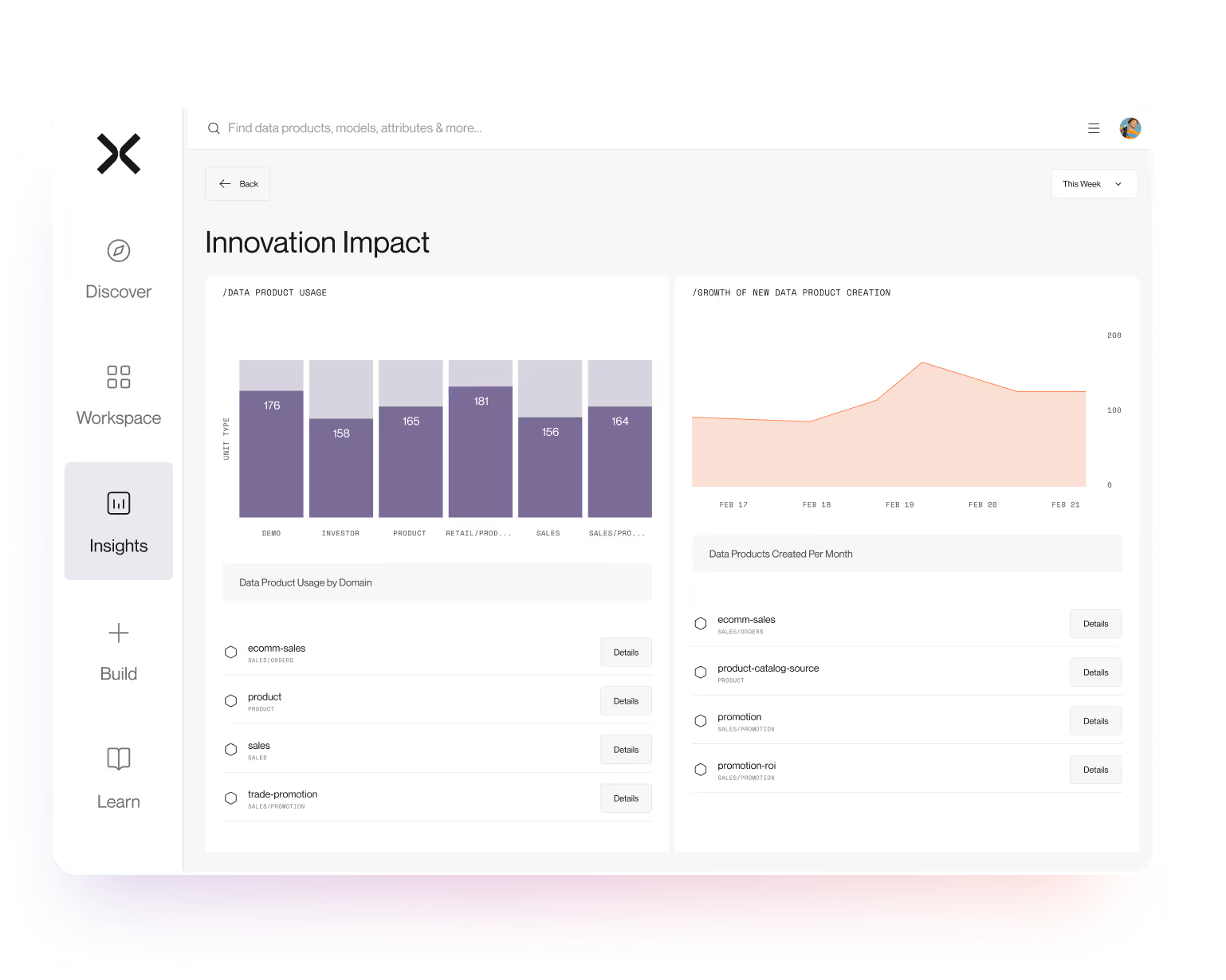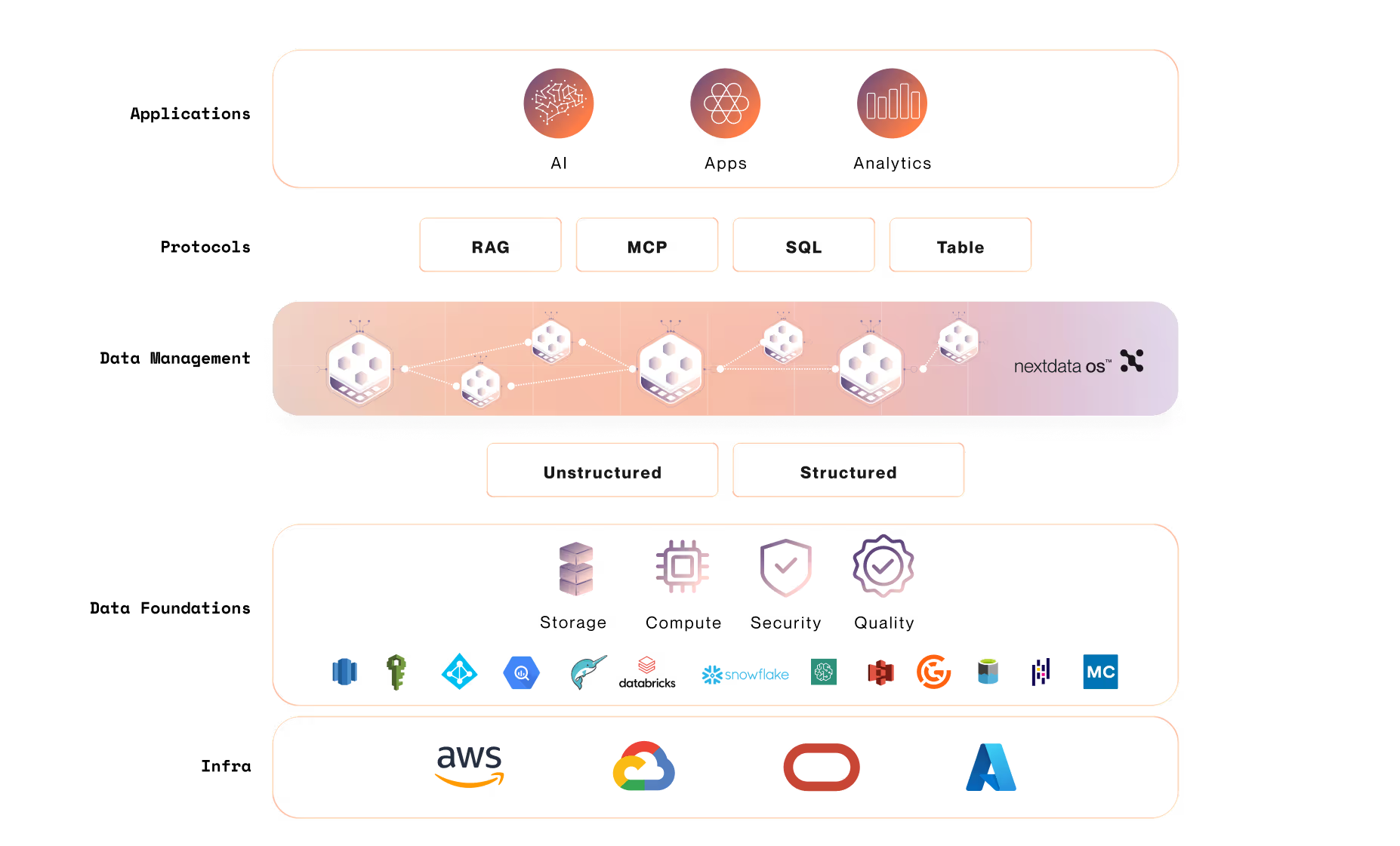
Turn any source into data products that run and govern themselves autonomously: composable, AI-ready, can ingest any format, run on any stack and serve any application.
Nextdata OS encapsulates your data management, automating everything you need to produce, manage and share data, and make it useful, safe, trusted and discoverable, for AI agents and humans
Autonomous data products not only provide MCP tools and resources, they are also multi-modal. They can support multiple data formats and protocols, including those that haven’t been invented yet.
Use Nextdata’s ”Nexty” copilot to help you turn any data source to domain-oriented, self-describing data products — generating semantic model definition, data transformation, access controls and quality controls into a unified, managed service. From legacy warehouses and lakes to APIs, pipelines and even spreadsheets—automatically created and validated.
Output the same data product as a table, vector embedding, file, or MCP endpoints—without extra pipelines or siloed flows. One domain-oriented semantic, many encodings for different applications.
Just configure your data product container and deploy—once. It runs every step—data sensing, ingesting, transforming, governing, and serving—inside a single autonomous unit. Agents and humans can access its continuously updated context.
Autonomous data products in Nextdata OS are self-publishing and instantly discoverable. Real-time metadata—like lineage, usage, quality, and domain semantic model—provides dynamic context, trust, and clarity for safe use. Humans can search by semantics and metadata to find the right product, and agents can use Nextdata OS MCP APIs to automatically discover and select the most relevant data products based on their goal or prompt intent.
Each data product is accessible through a single, domain-specific and secure endpoint—via API for agents or UI for humans.
Agents get structured, context-rich data for precise tasks; humans get an interface with full metadata and lineage.All endpoints auto-update with semantics, quality, and usage—so every user works with the safest, most relevant version.
Define contracts and controls as code—Nextdata enforces them automatically at every stage of the data product lifecycle, locally. On top of that, define global policies as code to continuously validate compliance across all data products, globally, so you always have trusted data, ready for agents, dashboards, and production use.
It’s more than monitoring—it’s autonomous governance that balances local autonomy with global compliance, computationally.


Autonomous data products automatically find and connect with their neighbours to make an observable mesh of data products across your enterprise. Automatically generated mesh-wide insights show you which data products are healthy and being used, and by which humans or agents. Insight into patterns of consumption and creation and infrastructure utilization dashboard help not only optimize storage and compute costs, but also drive organization-wide transformation.
Nextdata OS uses a pluggable driver architecture that lets your team pick the data stack and tools of choice. Data products orchestrate your existing storage, compute, security and quality systems—no migration or refactoring needed.
Drivers are open and extensible, so you can integrate data products into your custom stack.

Data product developers can publish autonomous data products with their tools of choice, including Python, YAML, SQL or other languages, using notebooks or IDEs supported by Nexty Copilot every step of the way.
AI agents can use APIs to browse continuously updated real-time metadata context, including semantic descriptions, lineage, data quality and usage statistics, so they can automatically find, get access and use the right domain-specific data for their tasks.
Data product consumers can find, trust, access data products from anywhere per continuously governed access control.
Data product and platform managers get real-time insights about health, utilization and business impact of data products in the mesh.
Data platform engineers can onboard business domains quickly, and enable self-serve data product development and management on multiple data stacks, leveraging existing infrastructure investments.
